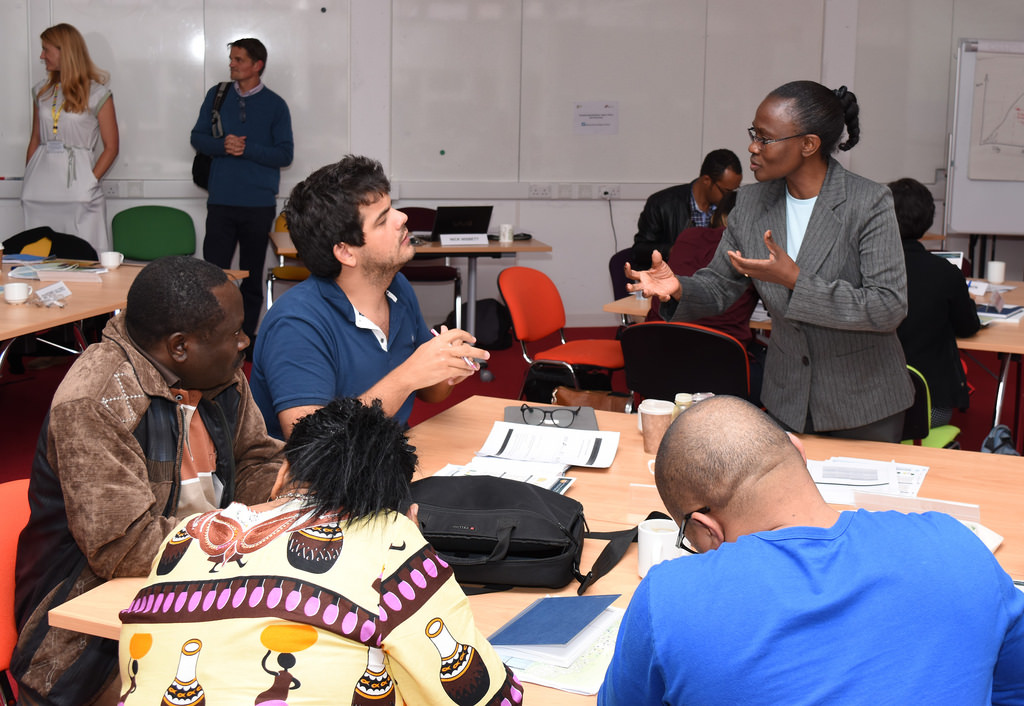Every year, IFPRI co-sponsors the Transforming Nutrition short course with the Institute of Development Studies in Brighton, U.K., as part of the Transform Nutrition consortium. The course is focused on bringing together those who have unique insights and experiences of transforming nutrition at a local, national, regional or even the international level, and harnessing that knowledge so they can lead nutrition policy and practice in their field. Enjoy the Storify below to find out what happened at last year’s course:
By the end of the program, the participants will be better able to contribute to the reduction of undernutrition in their sphere of influence through the following concepts and issues:
- The differences between undernutrition, malnutrition, food insecurity, hunger and hidden hunger
- The distribution of undernutrition and links to wider forms of malnutrition
- The causes and consequences of malnutrition
- What works where in addressing malnutrition and its determinants
- How to assess what works and why
- How to contribute to creating an enabling environment for nutrition, from policy to implementation.
Bringing together policymakers, researchers and civil society
In past years, participants have ranged from senior representatives within Prime Ministerial offices and other government bodies, to fellow researchers, to civil society activists, to representatives of large donor organizations and UN agencies. They have come from a huge variety of countries in sub-Saharan Africa, South and South-East Asia and the rest of the world and many (though not all) have some prior experience of working in nutrition in communities, in policy contexts and as activists.
The course allows a broad and comprehensive overview of nutrition’s multisectoral causes and consequences and particular insights on the evidence on what can be done. But more than this, it is sharing in the collective knowledge, experience and leadership from all the course participants and faculty alike which really makes this a unique experience which participants rate highly. As one participant commented:
“This course provides an excellent overview of global public health nutrition and of key policy developments. For me, it was a great opportunity to update my knowledge on the latest evidence of what works and to meet others working on similar issues. It was also a great opportunity to discuss challenges on the ground and exchange views of how best we can address these. I thoroughly enjoyed the week, including the social events organized by IDS, and felt re-energized by the end of it.” Silke Seco-Grutz, Human Development Adviser, DFID, previous course participant
Becoming part of the Leaders Network
Integral to this course is that participants take their experiences at the short course, and are able to use them to build on the already excellent work that they are doing. We are committed to maintaining the connections and the knowledge sharing between the participants of all the courses, as this is integral to maintaining understanding and tackling undernutrition. This is why we have set up the Leaders Network formed of the short course alumni.
Members of the network have shared with us their own “learning journeys.” Presenting incredibly different backgrounds and experiences, the learning journeys show how they came to shape nutrition policy and practice, and where they are headed in the future.This is central to our philosophy of enabling all people, whatever their level of seniority or background, to assume greater positions of influence as nutrition leaders and champions—because malnutrition requires need such multi-level, multisectoral leadership and action to be effectively tackled at scale.
Participate in the 2017 course
The course is co-convened with Purnima Menon (IFPRI) and will include contributions from myself and other IDS colleagues Inka Barnett and Dolf te Lintelo, Lawrence Haddad (Executive Director of Global Alliance for Improved Nutrition) and Stuart Gillespie (IFPRI) as well as a number of other key partners to be confirmed.
However, it is the participation of the policymakers, practitioners and researchers that make this course what it is. We look forward to hosting more nutrition leaders to the course and network this year. Applications close on Friday 7 April—so don’t miss out and apply now!
Nicholas Nisbett is an IDS Research Fellow. This post first appeared on the IDS blog.







